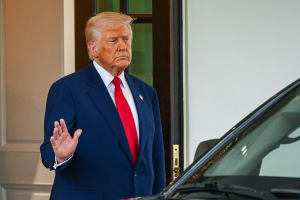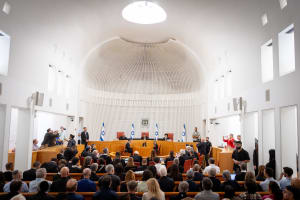Turkish foreign minister reportedly wants to visit Temple Mount in Jerusalem without Israeli officials
Such a visit could imply that Ankara recognizes East Jerusalem as part of the Palestinian Authority

Turkish Foreign Minister Mevlüt Çavuşoğlu, who is expected to visit Israel soon, reportedly wants to visit the Temple Mount in Jerusalem without any accompanying Israeli officials or security, according to Israeli news outlet KAN News.
While foreign dignitaries regularly visit Israel’s capital Jerusalem, official high-level foreign visits to the religiously and politically sensitive Temple Mount are uncommon. The Israeli Foreign Ministry in Jerusalem did not respond to the KAN report, stressing that the itinerary of the Turkish foreign minister’s visit to Israel was “not yet closed.”
The Temple Mount is officially within Israeli territory. However, following a status quo arrangement from 1967, the Islamic Waqf organization is responsible for the daily administration of the Temple Mount where the al-Aqsa Mosque stands on top of the ruins of the ancient Jewish Temple. The Waqf claims it has no information concerning a potential visit by the Turkish foreign minister to the Temple Mount.
Turkey has strongly backed the Palestinian Authority’s territorial claim to East Jerusalem and the Old City as its future capital. A potential visit by Turkey’s top diplomat to the Temple Mount without Israeli officials could signify that Ankara implicitly recognizes East Jerusalem as part of the Palestinian Authority.
In April, during the Muslim month of Ramadan, Turkey condemned Israel’s “unacceptable” security operations during violent clashes with radical Muslim rioters on the Temple Mount.
WHAT IS BEHIND TURKEY'S CHARM OFFENSIVE?
Nevertheless, in recent months, the Turkish government has indicated that it seeks to repair its strained diplomatic relations with Israel. The Turkish foreign minister and his Israeli counterpart will reportedly discuss the return of the countries’ respective ambassadors to the embassies in Tel Aviv and Ankara.
Relations between Ankara and Jerusalem deteriorated significantly following the 2010 Mavi Marmara incident, when 10 Turkish citizens were killed during violent clashes with Israeli naval commandos boarding the Turkish ship bound for the Hamas-ruled Gaza Strip. While the former U.S. administration under president Barak Obama tried to mediate between Ankara and Jerusalem, Turkish-Israeli relations hit a new low in 2018 when Turkey expelled the Israeli ambassador following lethal Gaza clashes and in protest against the opening of the American embassy in Jerusalem.
In early March, Turkish President Recep Erdoğan welcomed Israeli President Isaac Herzog. It was the first official state visit by an Israeli leader to Turkey since 2008. Erdoğan greeted Herzog with a guard of honor and played Israel's national anthem “HaTikva” (The Hope). Erdoğan stressed the importance of restoring Turkish-Israeli relations.
“Our shared goal is to accelerate and revive the political dialogue between the two countries, based on shared interest and respect to mutual delicacies,” the Turkish president said. “Strengthening and developing the ties between Turkey and Israel is highly valuable to our country and to peace in the region.”
However, Erdoğan – who has a history of documented harsh anti-Israeli and anti-Semitic rhetoric – did not suddenly become a genuine friend of Israel and the Jewish people. A weak Turkish economy, in combination with Israel’s emergence as a natural gas exporter, is at the center of the Turkish government’s recent charm offensive toward Jerusalem.
ENERGY ALSO ON THE AGENDA
Turkish Energy Minister Fatih Donmez is expected to accompany Çavuşoğlu during his visit to Israel. Following the Russian invasion of Ukraine, the European Union has intensified its efforts to find a viable substitute for its energy dependence on Russian gas. The East-Med gas pipeline, a joint initiative by Israel, Greece and Cyprus, opened the door to an alternative energy supply for the European states.
However, the Biden administration has so far tried to undermine the project, describing it as “too expensive, not viable.” Washington’s negative attitude appears to be linked to its efforts to appease Turkey, which has voiced its displeasure at being left out. However, the situation could change dramatically if Turkey is somehow included in the energy equation.
In February, Erdoğan reportedly expressed interest in Turkish-Israeli cooperation concerning gas supplies to the European market.
“We could use Israeli natural gas in our country, and beyond that, we could also work together to carry it to Europe,” said Erdoğan according to the Turkish pro-government paper Daily Sabah.

The All Israel News Staff is a team of journalists in Israel.














